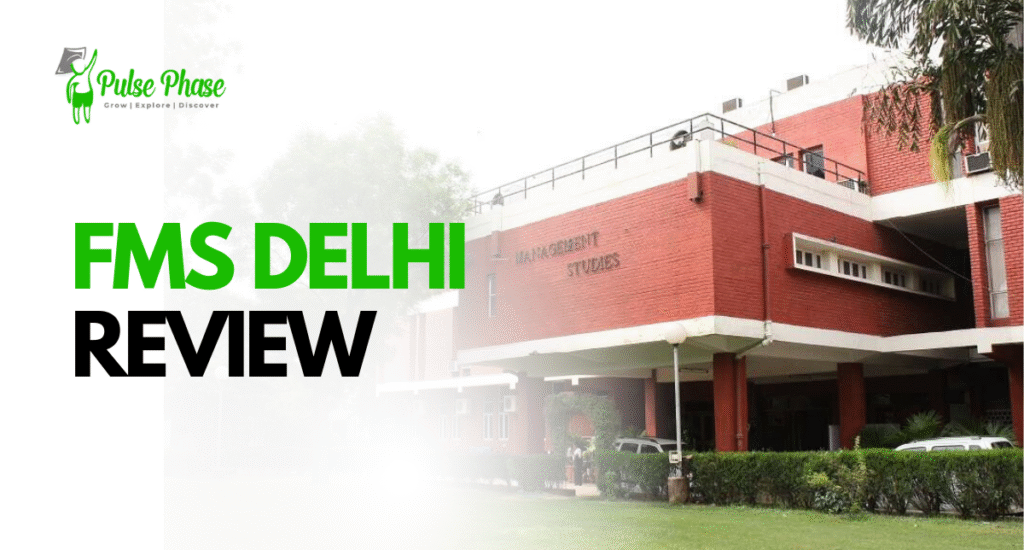The North Campus building of the University of Delhi, constructed with traditional red bricks, does not exude luxury. Well, if you have been through large, modern campuses of new private B-schools, FMS would feel humbled in comparison. But do not be fooled—the excellence packed in such walls cannot be matched. FMS Delhi Reviews clearly reflect that students, alumni, and recruiters all bear testimony to its unmatched reputation in management education. Let’s take a stroll through what’s good about FMS Delhi (and what isn’t).
What sets FMS Delhi apart is not its infrastructure but its legacy, academic rigor, and unbeatable return on investment. As one of the oldest and most prestigious B-schools in India, the institution is often referred to as the “Red Building of Dreams” for aspirants. Known for its dynamic peer learning environment, strong industry connections, and placement opportunities that rival even the top IIMs, FMS Delhi Review often highlights the unbeatable value it offers at a fraction of the cost. However, like any institution, it comes with its own set of limitations—mainly related to infrastructure and campus size—that may not impress first-time visitors.
FMS Delhi – A little background
FMS is not new—it was started way back in 1954. That’s older than some IIMs, which is why it has such a well-established alumni network. Slowly over time, it acquired a reputation for churning out leaders across industries—consulting, FMCG, finance, even government and NGOs. The institution has witnessed decades of transition, but it has remained consistent about one aspect: emphasis on management education that’s not expensive or ineffective.
FMS DELHI REVIEWS – The MBA programme in practice
The flagship two-year full-time MBA is the main attraction. The structure is fairly straightforward: the first year is about core subjects—finance, marketing, operations, HR, strategy, economics, all the usual suspects. The second year? That’s when students get to choose electives and lean into their interests.
Now, here’s the thing: FMS doesn’t pamper you with glossy teaching aids or unnecessary frills. The learning style is a mix of case studies, class debates, projects, and presentations. Professors expect you to come prepared, and classmates expect you to contribute. You can’t really hide in the back row here.
What makes classes lively is the fact that many faculty members bring industry exposure. On top of that, alumni often return for guest lectures or workshops. You’re as likely to hear about textbook models as you are to get first-hand stories about how deals or campaigns actually play out in boardrooms.
Cracking the Admission Code
Let’s be blunt: getting into FMS Delhi is brutally tough. Admission rests heavily on your CAT score, and the cutoff is usually sky-high—think 98, 99 percentile and above if you’re in the general category. And even then, you’re not done. Shortlisted candidates go through personal interviews and group discussions, where communication skills, clarity of thought, and presence of mind matter just as much.
What makes it harder is the sheer competition. Everyone applying to FMS knows the ROI is unbeatable, so the talent pool is stacked with high performers. If you’re preparing for CAT, you already know FMS Delhi is not a casual target—it’s an all-or-nothing kind of bet.
Adding to the challenge, the FMS Delhi admission process places a strong emphasis on both academic and non-academic excellence. The institute looks for candidates who can demonstrate leadership potential, adaptability, and the ability to thrive in high-pressure environments. Unlike some B-schools where a high CAT percentile can nearly guarantee a seat, here your overall personality and performance in the selection rounds matter equally. That’s why the FMS Delhi Review often highlights how competitive and holistic the admission journey is, making it one of the most respected entry gates into management education.
FMS Delhi – Fees Structure
Here’s where FMS Delhi flips the script. While most MBA programmes at top institutes cost between 15–30 lakh rupees, FMS charges roughly 2 lakh for the full two years. Yep, you read that right. The fees are so low that students often joke they spend more on Uber rides during placement season than on tuition.
Now combine that with the kind of placements FMS students land—consulting, investment banking, marketing leadership, product management roles with salaries in the 20–30 lakh range—and you can see why people rave about the ROI (return on investment). For a middle-class student who doesn’t want a decade of education loan hanging overhead, FMS feels like a blessing.
This unmatched affordability is what makes FMS Delhi’s fee structure a talking point in almost every FMS Delhi Review. Students from diverse socio-economic backgrounds are able to access world-class education without being shackled by heavy debt. In fact, many alumni credit the low fees as a key reason for being able to take career risks post-MBA—whether it’s joining a startup, pursuing entrepreneurship, or opting for roles driven by passion rather than just paychecks. That unique financial freedom is what truly sets FMS apart from its peers.
FMS DELHI REVIEWS: Placements
Every MBA aspirant stalks placement reports, right? So here’s the gist: FMS has excellent placements across sectors. Consulting firms, FMCG companies, top banks, and even big tech consistently show up. The average packages rival those of older IIMs, and the highest domestic and international offers make headlines each year.
The catch, though, is that with a smaller batch size, averages can swing more dramatically than at schools with larger cohorts. Still, the consistency of recruiter interest says a lot about the brand. Summer internships are strong too, giving students a taste of corporate life and often converting into pre-placement offers.
And yes, the alumni factor plays a huge role here. FMS grads are everywhere—so when recruiters come back, it’s often because someone at the other end of the table once sat in the same classroom.
READ ABOUT: IIM LUCKNOW REVIEW: A COMPLETE LOOK AT RANKINGS, STUDENT LIFE, AND CAREERS
FMS DELHI Campus and culture
Let’s not sugarcoat this: the campus isn’t fancy. FMS sits on Delhi University’s North Campus, surrounded by the buzz of cafes, bookshops, and student hangouts. The building itself is iconic in its own way, but if you’re expecting shiny auditoriums, manicured lawns, or endless hostels, you might feel underwhelmed.
But here’s the flip side: student life is buzzing. Clubs and committees cover everything from marketing to strategy to cultural activities. There are business festivals, guest sessions, case competitions—you name it. And because it’s part of Delhi University, students also get access to DU’s sports facilities, cultural events, and the city’s opportunities.
Think of it like this: if IIM campuses are self-contained little worlds, FMS is plugged into the real heartbeat of Delhi. That gives students more freedom—and a very different kind of energy.
Faculty and alumni
The professors at FMS include a mix of academic veterans and industry professionals. They’re known to challenge students, sometimes pushing them uncomfortably hard—but in the long run, that pressure works.
Then there’s the alumni network, which honestly deserves its own section. From CEOs of multinational firms to leaders in consulting, FMCG, and entrepreneurship, the alumni base is one of FMS’s strongest assets. They frequently return as mentors, speakers, or recruiters. If you join FMS, chances are your first boss or mentor may be someone who once walked the same corridors.
Who fits in best at FMS DELHI?
Let’s break it down. FMS Delhi is perfect for:
- Value seekers: Students who want top-notch management education without sinking into massive debt.
- High achievers: Those who thrive in competitive classrooms where everyone’s razor sharp.
- Urban explorers: If you like the idea of studying in a city, with access to both academia and corporate hubs, Delhi is unbeatable.
But it might not be ideal for:
- Students who put a huge premium on swanky infrastructure.
- People who prefer a quieter, more insulated campus experience.
- Those not comfortable with extreme academic and peer pressure.
READ ABOUT: IIM CALCUTTA REVIEW – ACADEMICS, PLACEMENTS & CAMPUS LIFE
A regular day at FMS DELHI
Picture this: an 8:30 a.m. class where you’re grilled on a case study you stayed up till 2 a.m. preparing. Then a group assignment. Then maybe a guest lecture by an FMCG head. After that, club meetings, competition prep, or placement training. And at night? More prep for tomorrow.
Life at FMS is intense, packed, and competitive—but students often say it’s also the most transformative two years of their lives.
FMS DELHI REVIEWS – The bigger picture
To be fair, FMS isn’t perfect. The infrastructure could use upgrades, and the competition is cutthroat. But step back for a second: you’re paying around 2 lakh for a degree that lands you in the same boardrooms as people who paid 20 lakh or more elsewhere. That’s the magic of FMS.
It’s not just about low fees and high salaries, though. It’s about the culture of ambition, the camaraderie in a small batch, and the chance to study in the heart of India’s capital. That’s why people still call it the Red Building of Dreams—because for so many students, it turns out to be exactly that.
READ ABOUT: Management Colleges, CAT, CAT Exam, MBA, MBA Colleges, top MBA college
FMS DELHI REVIEWS – Final verdict
FMS Delhi is not flashy. You will not be awed by marble floors or lush green lawns. What it offers, though—tough courses, proactive peer group, unbeatable ROI, and opportunities that transform your life—is all priceless.
If you’re a serious CAT aspirant looking for something good and not excessively expensive, this must feature near the top. Be prepared, though: it’s not an easy journey, it’s highly competitive, and it never lets up. If you’re good for it, though, FMS will provide two years you will not forget and a career to compensate for all the hard work.
FAQs
Q1. Is FMS better than IIMs?
Not a simple yes or no. In terms of ROI, FMS often beats the IIMs hands down. But if you’re looking for global recognition and larger campuses, older IIMs still have an edge.
Q2. What is the CAT cutoff for FMS Delhi?
For general category aspirants, it usually sits in the 98–99+ percentile range. Exact numbers vary year to year.
Q3. Does FMS provide hostel facilities?
Yes, but hostel accommodation is limited. Many students choose to stay in nearby rented flats or PGs around North Campus.
Q4. How much does the MBA cost at FMS?
Around INR 2 lakh for the full two years, making it one of the most affordable MBAs in the country.
Q5. What kind of roles do students get during placements?
Top roles come in consulting, finance, marketing, general management, and product management, with recruiters from FMCG, tech, banking, and consulting firms.
READ MORE ABOUT:

